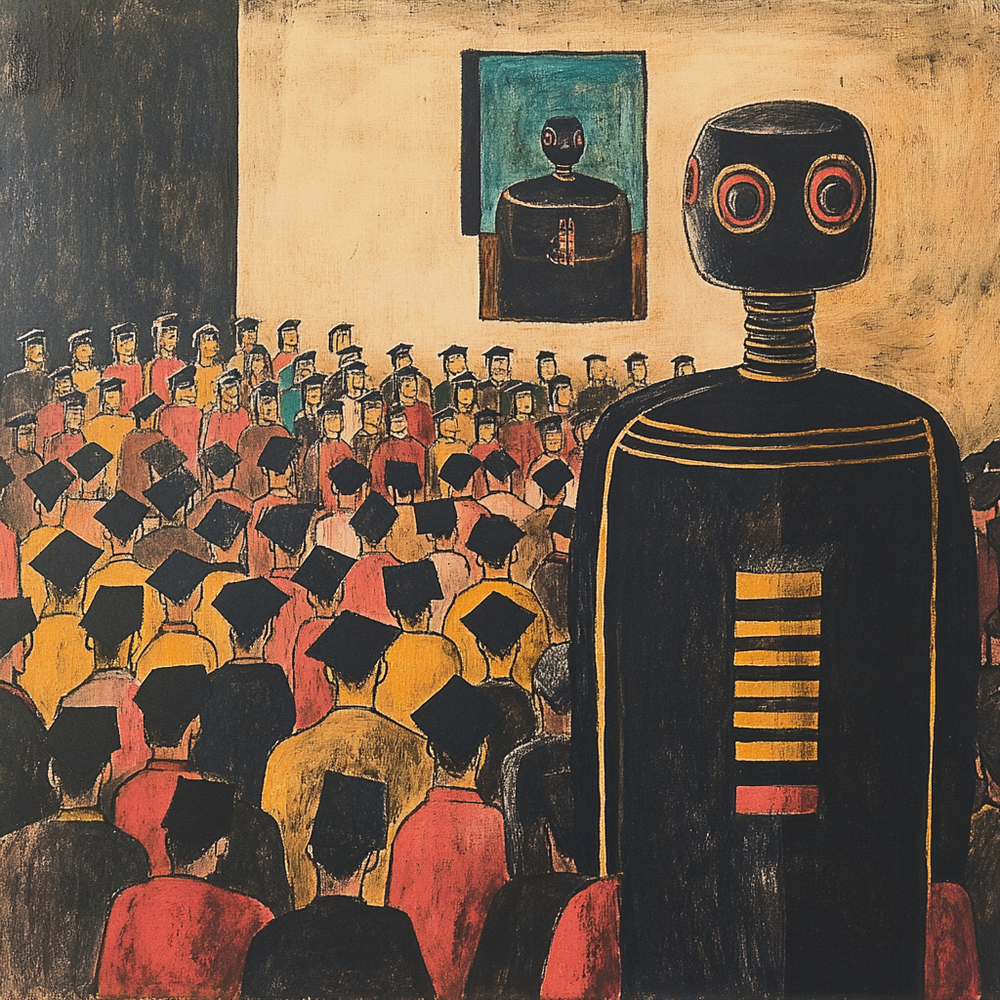
Caption
Some universities are using AI to help read student names at graduation ceremonies.
Credit: Image by Midjourney AI

Some universities are using AI to help read student names at graduation ceremonies.
Young adults across Georgia will soon be passing that major milestone: walking across the stage, taking their diplomas in hand and basking in the applause after their names are read.
Most friends and family members cheering from the stands won’t give the person behind the voice a second thought, but in some Georgia colleges, there may be more to those announcers than meets the ear, and some rising graduates say they’re not happy about it.
At least three universities in the state have reported using services that incorporate artificial intelligence to read the names of students preparing to turn over their tassels, including the University of Georgia, Georgia Tech and Kennesaw State University.
Tassel, the company these universities use, boasts a database with phonetic pronunciation components for over 100,000 names, according to its website. The software is trained on thousands of previously recorded names from voice artists, which Tassel says results in a natural and authentic reading with a lower chance of flubs or mispronunciations.
UGA communications director James Hataway said the university uses Tassel’s services for graduate commencement ceremonies — individual student names are not read at undergraduate commencements — and that it also allows students to create personalized graduation slides for the program.
“UGA has coordinated with this company and its predecessor–Marching Order–since 2020, and it has been a great benefit to the flow of the commencement ceremony,” he said.
Graduates at schools that use Tassel get the opportunity to review the pronunciation of their name before the ceremony, and if the system can’t get it right, they can record the name and send it to the company to ensure it is pronounced correctly.
“We now utilize AI to generate names when possible,” according to a company FAQ. “The synthetic voices are based on real voice artists, who will still be engaged to create new recordings if a graduate’s name is not pronounced to their satisfaction at first.”
Some Georgia students say the thought of an AI generated voice reading out their name on their big day seems wrong.
An online petition at Change.org urging the University of North Georgia not to use the software for its upcoming commencement ceremonies has garnered more than 1,800 signatures.
“Graduation is so much more than just another school event to set up and take down within a week,” the petition reads. “It is a celebration of each student’s success, a reflection of how much they have grown, and the ultimate payoff for their hard work. What UNG plans to do does not represent how a university should handle recognizing their graduating students as they advance to the next chapters of their lives.”
Petition signers echoed those sentiments, and some called it hypocrisy for the university to use AI in this way while taking a hard line against its use by students.
The school made headlines last year after a student was put on probation after a teacher accused her of using AI to write a class paper. The student said she wrote the paper herself and only used software to check her spelling, grammar and punctuation.
UNG communications director Clark Leonard said the school hopes the new technology will make the ceremony more special for students.
“Our focus is never on any one element in isolation — it’s about the full experience and finding thoughtful ways to make this special day even more personal, inclusive, and celebratory for every graduate,” he said. “For example, this technology allows us to synchronize each graduate’s name with video board displays, on-screen captions, and the announcement itself, creating a more consistent, accessible and respectful moment for every student crossing the stage.”
Georgia State University professor Arun Rai, co-founder and director of the university’s Center for Digital Innovation and a member of the Georgia Technology Authority’s AI Advisory Council, said as artificial intelligence technology improves, we should expect to see it integrate more and more into established traditions like graduations.
When it’s used correctly, he said, it can help solve logistical or accessibility challenges like making sure names are pronounced correctly and integrating with on-screen captions or other assistive technologies..
“That said, I understand why students might feel slighted or worry that an AI voice removes the personal connection they’ve looked forward to — especially on a day as emotionally significant as graduation,” he said. “Hearing your name read aloud by another human being who shares your sense of pride can feel more meaningful and communal. It’s not just about the words, but the tone of voice, the excitement, and the sense that a fellow person is celebrating right along with you.”
Rai said universities should seek to strike a balance between tradition and innovation and welcome student feedback .
“I’d reassure students that their university experience — and the relationships they’ve built — shouldn’t be overshadowed by this single use of AI,” he said. “At the same time, it’s completely fair for them to expect a ceremony that feels personal and special. If there’s been a communication gap or if students believe the focus on efficiency is overriding tradition, it’s worth raising those concerns, as they’re doing.”
“Ultimately, commencement should recognize the human stories of resilience, achievement, and growth — an AI tool is only helpful if it respects and enhances that experience,” he added.
This story comes to GPB through a reporting partnership with Georgia Recorder.